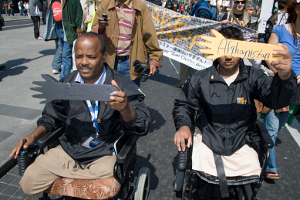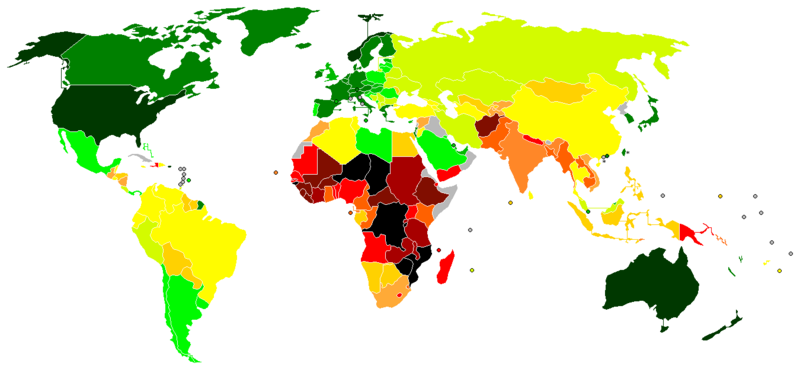Nato continues its air strikes in Libya
September 16, 2011 | categories: Politics, Libya | View Comments
Despite the declared "victory" and the fall of the Gaddafi regime in late August, NATO continues to conduct daily air strikes across Libya.
"All sorties" is the daily number of individual aircraft that NATO flew into Libya. "Strike sorties" is the number of warplanes that drop bombs and missiles.
Since the beginning of the NATO operation on Mar 31, a total of 22,817 sorties, including 8,560 strike sorties, have been conducted.
The chart is based on data published by NATO, and it will be regularly updated. You may download and reuse the chart freely using the download icon in the top-right corner. You may also want to download the raw data in TSV format.
Related: here is a map of sixteen cities that NATO attacked between Aug 22 and Sep 16:
I'm also hosting an archive of 854 articles from the Libyan state news agency's website www.jana-news.ly, some of which contain detailed accounts of Nato attacks. The site was shut down last week.
Update Sep 16: @drebha sent me this link to an online spreadsheet that also has the number of sorties, along with many more details extracted from NATO's documents.
Cluster bombs hypocrisy
April 17, 2011 | categories: Politics, Libya | View Comments

Ban Advocates from Afghanistan and Ethiopia demonstrating outside of the Convention on Cluster Munitions conference in Dublin. image source
On Friday, Human Rights Watch reported that the Libyan army had used cluster bombs in residential areas in the city of Misrata.
Some the of the newspaper articles I read about this story mentioned that there's a treaty between more than a hundred states that have agreed to ban cluster bombs.
Why ban cluster bombs? One reason is that they have a very broad area of effect, often harming civilians in attacks. Another is that they contain up to a hundred bomblets that may fail to explose initially but remain live and explode when handled, thus posing a risk similar to landmines.
Wikipedia explains that
98% of 13,306 recorded cluster munitions casualties that are registered with Handicap International are civilians, while 27% are children.
The Convention on Cluster Munitions (CCM) that bans cluster bombs was adopted in 2008. And indeed, over a hundred states have since signed the treaty, though 52 of those still have to ratify. [1]
However, a number of countries have opposed the treaty. These are mostly the same countries that produce and stockpile significant numbers of cluster munition. They include the United States, Israel, Russia, China, India, Pakistan and Brazil. Libya has also not signed the treaty.
In defense of their opposition of the ban, the US said that cluster munitions had a "clear military utility in combat" and that they actually cause less harm to civilians than some other weapons. But that's certainly nonsense. The United Nations estimate that around 40% of cluster bomblets fired by the Israeli Defense Forces in the 2006 Lebanon war failed to explode on impact. [2]
From Wikipedia:
Given that each cluster bomb can contain hundreds of bomblets and be fired in volleys, even a small failure rate can lead each strike to leave behind hundreds or thousands of [unexploded ordnances] scattered randomly across the strike area. For example, after the 2006 Israel-Lebanon conflict, UN experts have estimated that as many as one million unexploded bomblets may contaminate the hundreds of cluster munition strike sites in Lebanon.
It's also estimated that, today, around 300 Vietnamese die annually from exploding bomblet duds that date back to the Vietnam war (1955-1975).
The United States do not only decide to continue producing deadly cluster bombs which are exported to many countries in the world. They also continue to use them themselves, as recently as 2006 in Iraq. stopclustermunitions.org has four maps that detail affected countries (36), users of cluster bombs (15), producers (34), and stockpilers of cluster munitions (85).
The four most common users of cluster bombs counted by the number of wars they used them in are:
- the United States: 9 wars (since 1965)
- Israel: 5 wars (since 1973)
- Russia: 4 wars (since 1979)
- the United Kingdom: 4 wars (since 1982)
As you can see, the US and UK are among the biggest users of these horrible weapons. Yet these same countries are at the forefront of those accusing Libya of atrocities against civilians, and demanding its leader Muammar Gaddafi to step down. And the recent Human Rights Watch about the alleged use of cluster bombs by the Libyan army in Misrata report supports these accusations.
A former head of the UK's armed forces, Lord Dannatt, was quoted yesterday with regard to the cluster bomb finding:
If we thought that Gaddafi had lost the moral right to rule this country a month ago, he has lost it in the last 24 hours, that's for sure.
Following his logic, the UK government has long lost its 'moral right' to rule. Or maybe what Dannatt means is it that it's morally acceptable when it's the British military that drops cluster bombs on Arab civilian areas.
There isn't, however, much evidence to this cluster bombs story. Since the beginning of the protests, the mainstream media has been constantly pumping out similar accusations, and many of these already turned out to be false. John Pilger notes in his article from 6th April:
Statements by western officials and media that a "deranged and criminal Colonel Gaddafi" is planning "genocide" against his own people still await evidence.
Libyan government spokesman Moussa Ibrahim strongly denied the use of cluster bombs: "Absolutely no. We can't do this. Morally, legally, we can't do this." He continued to say that "the evidence would remain for days and weeks, and we know the international community is coming en masse to our country soon". [3]
A few days before the cluster bomb incident, the Libyan authorities invited a Red Cross team to Misrata to assess the situation. Also, Libya has asked for a UN fact finding mission in the past, which has now started since about a week. [4]
There is similarities here with the lead-up to the US-led invasion of Iraq in 2003.
Before the war in Iraq, a UN fact finding mission led by Hans Blix went to Iraq to find if there was indeed any "weapons of mass destruction" (WMD), the threat of which were used by the US and UK as a justification for their invasion.
Blix and his team praised a "proactive" Iraqi cooperation, yet they did not find any WMD, until they were quickly shut out of Iraq by the US when the war started. [5] [6]
In an interview on BBC TV in February 2004, Blix accused the US and British governments of dramatising the threat of weapons of mass destruction in Iraq, in order to strengthen the case for the war against the regime of Saddam Hussein. Ultimately, no stockpiles of weapons of mass destruction were found. [7]

Colin Powell's February 2003 UN meeting presentation slide showing an alleged Iraqi-ordered Aluminum Tube for Uranium Enrichment. image
Update April 21, 2011
A week ago, The Boston Globe wrote: [8]
Evidence is now in that President Barack Obama grossly exaggerated the humanitarian threat to justify military action in Libya. The president claimed that intervention was necessary to prevent a "bloodbath" in Benghazi, Libya’s second-largest city and last rebel stronghold.
But Human Rights Watch has released data on Misurata, the next-biggest city in Libya and scene of protracted fighting, revealing that Moammar Khadafy is not deliberately massacring civilians but rather narrowly targeting the armed rebels who fight against his government.
An independent group called the "British Civilians for Peace in Libya" that visited Western Libya for a week on a fact finding mission, comes to a similar conclusion. In their interim report they say they "are concerned that western media outlets are failing in their duty to report on the conflict truthfully." [9] See the Sky News article from April 19, 2011.
| [1] | 108 states on board the Convention on Cluster Munitions, Convention on Cluster Munitions official website |
| [2] | IDF commander: We fired more than a million cluster bombs in Lebanon, HAREETZ.com, 12 Sep 2006 |
| [3] | Battles for Libyan cities rage on, Al Jazeera English, 17 Apr 2011 |
| [4] | UN says its Libya human rights abuses investigation will cover all sides involved in fight, The Associated Press, 8 Apr 2011 |
| [5] | Blix welcomes accelerated cooperation by Iraq, but says unresolved issues remain, United Nations official website, 7 Mar 2003 |
| [6] | Blix takes Washington to task, CNN.com, 12 June 2003 |
| [7] | Blix doubts on Iraq intelligence, BBC News, 8 Feb 2004 |
| [8] | False pretense for war in Libya?, The Boston Globe, 14 Apr 2011 |
| [9] | British Citizens for Peace in Libya – Interim Report, Straight Talk, 19 Apr 2011 |
Libya is different
March 02, 2011 | categories: Politics, Libya | View Comments
The situation in Libya is very different to that of other Middle East and North African countries in revolt. Yet, the public opinion likes to put Libya into the same box.
Today, Libyan leader Gaddafi addressed on TV the recent developments in Libya.
You may think of the Libyan government and its eccentric leader however you want. But if you believe that Libya's uprising is similar to those in revolting neighbouring countries, then you're wrong.
What's happening in Libya is a civil war. Rebels are armed and they strategically capture cities and oil fields. This is very different to the peaceful demonstrations of millions of people that we've seen in images from Cairo.
A look at Libya's history and current state reveals that the situation in Libya is much different to that of neighbouring countries.
Libya is today arguably one of the most independent states of post-colonial Africa. It is widely accepted that Libya's welfare system is one of the best on the continent. From Wikipedia:
During the 1970s, the government succeeded in making major improvements in the general welfare of its citizens. By the 1980s Libyans enjoyed much improved housing and education, comprehensive social welfare services, and general standards of health that were among the highest in Africa.
(1969 is when Gaddafi came to power.)
In the Human Development Index, Libya is the only African state that reaches 0.75 points. It's the only green spot on the African continent for 2010:

In 1971, Libya kicked out British Petroleum. During the 70s, the state gained control of 70% of its oil production. State revenues from oil export more than quadrupled as the oil prices went up three times. And the benefitors were to a large extend the people of Libya.
Compare this to countries like Nigera, where Shell has lots of influence on the government and gets the best deals, at the cost of lots of suffering. There, welfare is virtually non-existant. Or take Saudi Arabia, where the oil revenues also benefit only a few.
And then countries like Nigeria that are practically in foreign hand and follow capitalist agendas are the ones that are opposed to the idea of an United States of Africa, which is Gaddafi's Pan-African effort with the goal of freeing more of Africa's countries from what is effectively colonialism in disguise. Surely, the recent developments in Libya will be a setback for these efforts. (See also Neocolonialism.)
NB: I'm not saying that Gaddafi is or is not unjustly using force against the people of Libya. That I can't assess. I'm merely trying to put things into perspective. [1]
In his TV appearance today, Gaddafi argued that there were no peaceful protests in Libya, as there were in Egypt or Tunisia. He said that the opposition forces are militants, and that they're are stragically targeting for the country's oil fields.
Update. See also:
- Libya rebels isolate Gaddafi, seizing cities and oilfields
- a United Nations Human Rights Council report on Libya from January 2011
- a BBC interview with Noam Chomsky from 8 March 2011 on the situation in the Arab world
| [1] | As it turns out, most claims of Gaddafi's human rights abuses turned out to be fabrications. See False pretense for war in Libya? [boston.com], Amnesty questions claim that Gaddafi ordered rape as weapon of war [independent.co.uk] and The Top Ten Myths in the War Against Libya [counterpunch.org]. |
« Previous Page